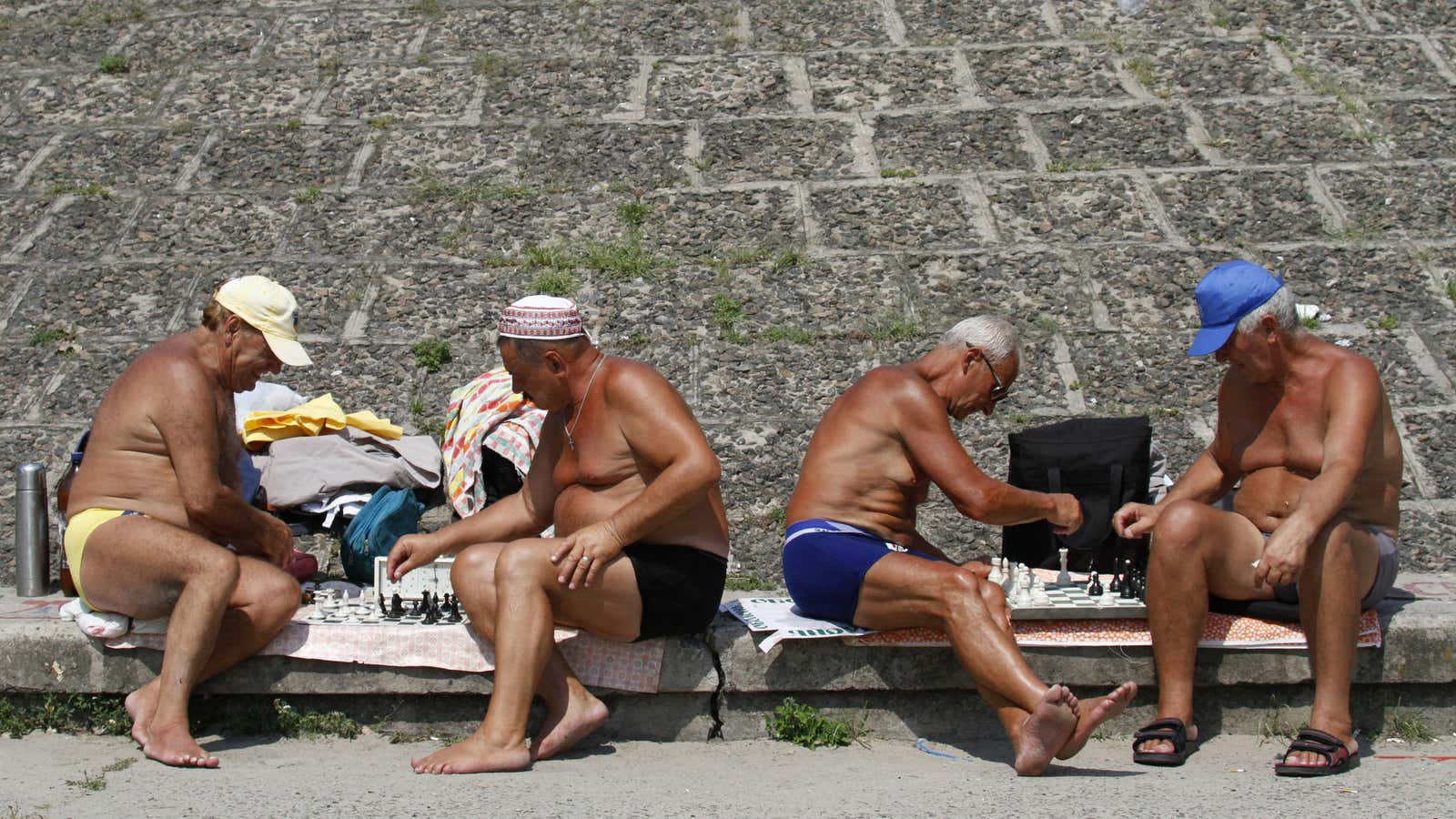There is a battle raging, but no shots have been fired. This fight is a demographic one, between old people collecting pensions and the younger workers who pay for them. If you weren’t aware of this, don’t worry—it’s already over, and the young lost.
What’s more, along the way, pensioners have outmaneuvered another group in the fight for future resources: bond holders. When times are tough, tricky decisions must be made about how to divvy up money and services. Who pays the biggest price is always the same (in descending order): workers, bond holders, and then pensioners.
Economic turmoil in recent years has pushed vulnerable governments into full-blown fiscal crises. Deciding what to do about under-funded pensions, which usually feature in financial disasters, is when the battles between young and old, and between lenders and pensioners, play out. The young lose out via lower wages and fewer services; bond holders get burned by haircuts and maturity extensions. Only bond holders are still offering much resistance to the primacy of pensioners, but the odds aren’t in their favor.
Take Puerto Rico, which missed a bond payment this week. Services have been slashed to pay what debt the island can afford. An even bigger battle is brewing over the teachers’ and municipal employee’s pension funds, which are nearly out of money but on the hook to pay out $1 billion a year in benefits.
When the pension money runs out, Puerto Rico’s meager tax revenue will not be enough to cover both its bonds and promised pension payments—let alone many public services. Legally, Puerto Rico’s bonds and pensions are guaranteed by its constitution, and thus cannot be impaired. Bond holders are supposed to be first in line for repayment, but if Puerto Rico’s fiscal drama plays out like most others elsewhere, pensioners will end up making the smallest sacrifices.
In Greece, Piraeus University economist Platon Tinios estimates that cuts to pensions were fairly modest relative to the steep costs that other groups paid (pdf). In fact, the poverty rate among Greek pensioners fell by around 6 percentage points since 2010, while poverty increased 4.5 percentage points among working-age Greeks. Bond holders faced write-downs and extended repayment periods, but “pensions cuts in all cases were smaller than bond holder hits,” Tinios says.
A bankrupt Detroit couldn’t keep its lights on, but still paid pensions. There was a contentious fight between bond holders and pensioners, and in the end municipal workers took a 4.5% pension reduction, while police and firemen suffered no nominal reduction in payouts. Bond holders paid a steeper price, receiving between 34% and 74% of the face value of their holdings. The city’s financial recovery plan also features a $195 million balloon payment into public pensions funds in 2024, a huge and looming strain on the city that still struggles to pay the teachers on its payroll.
Why do pensioners get so much sympathy? Many are paid modest amounts, are old and vulnerable, and—crucially—are reliable voters. What’s more, the years of financial mismanagement it takes to put their supposedly guaranteed retirement savings at risk are not their fault. But it’s worth questioning why their claims so often receive the highest priority.
Paying the old by skimping on services—like education—for the young defies economic logic. And while we normally associate bond holders with greedy hedge funds, quite often the money in those hedge funds come from other pension funds, so burning them to protect pensioners can be self-defeating.
When people ask me why Puerto Rico matters—other than the humanitarian concerns—I tell them it is an important battle between pensioners and bond holders. It has implications for other governments who need to issue debt to pay bills but also struggle to service pension obligations. That young taxpayers lose out when things go bad is already a given, but bond holders are still fighting for their rights. Every crisis gives us more clarity on what promises matter the most—after Puerto Rico, more battles are coming in Brazil, Chicago, and in the private sector.
